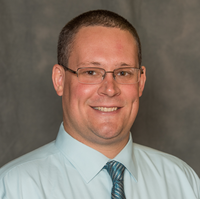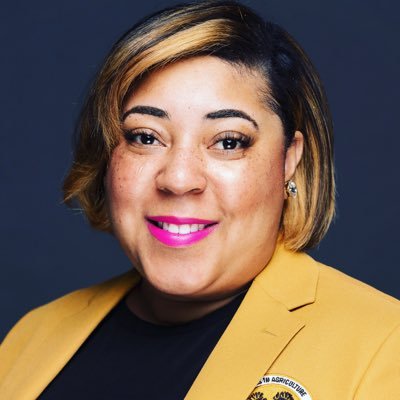MSU awarded grant to expand career education opportunities in food, agriculture, and natural resources fields
This three year effort will support urban Michigan students and teachers through the development of food, agriculture, and natural resources curricula and five Jr. MANRRS chapters.

Michigan State University was awarded $280,997 from the National Institute of Food and Agriculture at USDA to strengthen food, agriculture, and natural resources career pathways for students in urban Michigan.
The project, “Collaborative Approaches to Building Food, Agriculture, Natural Resources, and Human Sciences Content and Career Learning in Urban Michigan,” will focus on developing food, agriculture, and human sciences curricula with school science teachers in cities like Detroit, Flint, Lansing, and Saginaw.
The project team includes Dr. Buddy McKendree, Dr. Aaron McKim, Dr. Jennifer Hodbod, Dr. Quentin Tyler, and Dr. Mike Everett from MSU. Dr. Antomia Farrell from the National Society of MANRRS (Minorities in Agriculture, Natural Resources and Related Sciences) and Dr. Orlenthea McGowan from Langston University are also collaborators on the project.

“In Michigan, some of our most populated areas do not have any school-based agricultural education. This proposal was really a way for us to reconsider how we can get that content and career learning in areas that don’t have school-based agricultural education,” says lead investigator Buddy McKendree, Assistant Professor in the Department of Community Sustainability.
“We have to prepare our future leaders in the agriculture industry,” says Antomia Farrell, National President of MANRRS.
The curricula developed through this collaboration will be designed in accordance with Next Generation Science Standards, with the ultimate goal of increasing student, teacher, and administrator interest in establishing formal school-based agricultural education programs.
Orlenthea McGowan, Professor at Langston University, will support teachers to integrate these curricula in their classrooms through a one-week immersive teacher training.
The Agriculture, Food, and Natural Resources Education program in MSU’s Department of Community Sustainability has always focused on K-12 education and career development. Expanding existing agriculture, food, and natural resources career pipelines through the lens of diversity, equity, and inclusion is a critical next step for the work.

“This is a culmination of multiple things we’ve been working on,” says Quentin Tyler, Associate Dean and Director for Diversity, Equity and Inclusion in the College of Agriculture and Natural Resources (CANR). “This effort not only focuses on recruitment, but also retention.”
In Tyler’s role in CANR, he is responsible for increasing student diversity and recruiting and retaining students. This project will support that effort as more pre-college students in Michigan will access career learning opportunities in the food, agriculture, and natural resources fields.
Working with the National Society of MANRRS is integral to diversifying and strengthening this career pipeline. There is a strong MANRRS chapter at MSU, but there are currently no registered Jr. MANRRS chapters in the state of Michigan. One outcome of this project is to develop five Jr. MANRRS chapters in urban Michigan schools over the next three years.
Farrell says, “I think representation is very important: to see that there are BIPOC communities who have been through these particular careers, and from an educational standpoint, to know that they can do the same thing that we’re doing today.”

“Within MANRRS what we’re really looking at is developing a cohesive structure for our Jr. MANRRS program,” shares Farrell. “We focus on developing a pipeline approach as early as 7th grade to bring awareness of the agriculture, natural resources, and related sciences industry.”
This new initiative is building on past and current efforts in coordinating a Jr. MANRRS presence in the state of Michigan by the MSU MANRRS chapter and advisors Stephanie Chau, Dr. Eunice Foster, and Phillip Seaborn.
The national and statewide perspectives involved in this work make this project particularly exciting. The team hopes that this collaborative approach can be replicated in future efforts.
Tyler notes, “This effort is a collaboration between an 1862 institution, an 1890 institution, and a nonprofit, so to me, it’s a model showing different ways we can work together across organizations and across universities.”
Ultimately, this project will help meet the growing demand to fill jobs in the agriculture, food, and human sciences fields. Educating young adults about where food comes from and how to sustainably manage natural resources is a critical entry point for these careers.
McKendree sums up the significance of the project well.
“Agriculture, food, and natural resources are intertwined in our lives,” he says. “Everybody eats, everybody interacts with the environment. It’s relevant for everyone.”
This project is one of six recently awarded Secondary Education, Two-Year Postsecondary Education, and Agriculture in the K-12 Classroom Challenge (SPECA) grants. The SPECA program seeks to promote, strengthen, and foster linkages between secondary, two-year postsecondary, and higher education programs to encourage more young Americans to pursue and complete a baccalaureate or higher degree in food, agriculture, natural resources and human science disciplines. Learn more about the project in NIFA’s Current Research Information System.



 Print
Print Email
Email

